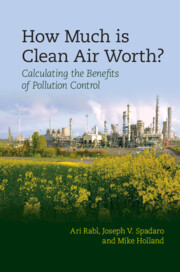Book contents
- Frontmatter
- Contents
- List of figures
- List of tables
- Foreword
- Preface
- Acknowledgements
- 1 Introduction
- 2 Tools for environmental impact and damage assessment
- 3 Exposure–response functions for health impacts
- 4 Impacts of air pollution on building materials
- 5 Agriculture, forests and ecosystems
- 6 Other impacts
- 7 Atmospheric dispersion of pollutants
- 8 Multimedia pathways
- 9 Monetary valuation
- 10 The costs of climate change
- 11 Uncertainty of damage costs
- 12 Key assumptions and results for cost per kg of pollutant
- 13 Results for power plants
- 14 Results for waste treatment
- 15 Results for transport
- 16 Lessons for policy makers
- Appendix A Nomenclature, symbols, units and conversion factors
- Appendix B Description of the RiskPoll software
- Appendix C Equations for multimedia model of Chapter 8
- Index
Foreword
Published online by Cambridge University Press: 05 July 2014
- Frontmatter
- Contents
- List of figures
- List of tables
- Foreword
- Preface
- Acknowledgements
- 1 Introduction
- 2 Tools for environmental impact and damage assessment
- 3 Exposure–response functions for health impacts
- 4 Impacts of air pollution on building materials
- 5 Agriculture, forests and ecosystems
- 6 Other impacts
- 7 Atmospheric dispersion of pollutants
- 8 Multimedia pathways
- 9 Monetary valuation
- 10 The costs of climate change
- 11 Uncertainty of damage costs
- 12 Key assumptions and results for cost per kg of pollutant
- 13 Results for power plants
- 14 Results for waste treatment
- 15 Results for transport
- 16 Lessons for policy makers
- Appendix A Nomenclature, symbols, units and conversion factors
- Appendix B Description of the RiskPoll software
- Appendix C Equations for multimedia model of Chapter 8
- Index
Summary
In the Western world, it has been a long journey to achieve the current ecological and social transition. The US National Environmental Policy Act of 1969 and the European Community Environmental Action Programme of 1973 opened the way to establishing cost–benefit analysis and, later, the polluter-pays principle. The 1981 US Presidential Executive Order 12191 required Impact Assessment studies to be carried out for all major policies presented by the Federal Government, while the 1986 Single European Act stipulated that, when developing environmental policies, the European Community will take account of available scientific and technical data, and of benefits and costs of actions and lack of action.
Within this context, at the end of the eighties, the EU and USA (European Commission’s DG XII – Science and Research and US Department of Energy) launched a fruitful collaboration on a joint study on fuel cycle cost that gave birth to the so-called ExternE – Externalities of Energy – project series, funded since then and with different names by the European Commission through its successive Research Framework Programmes.
Among the pioneer actors of this interdisciplinary research work, one can mention David Pearce, Ari Rabl, Anil Markandya, Olav Hohmeyer, Robert Shelton, Russell Lee, Alan Krupnick, Nick Eyre and Richard Ottinger. More recently, key researchers in the field of external costs quantification, tackling the issues of energy, environment and transport have been Mike Holland, Jacquie Berry, Rainer Friedrich, Andrea Ricci, Joseph V. Spadaro, Stale Navrud, Stefan Hirschberg and Milan Scasny.
- Type
- Chapter
- Information
- How Much Is Clean Air Worth?Calculating the Benefits of Pollution Control, pp. xxv - xxviiiPublisher: Cambridge University PressPrint publication year: 2014



